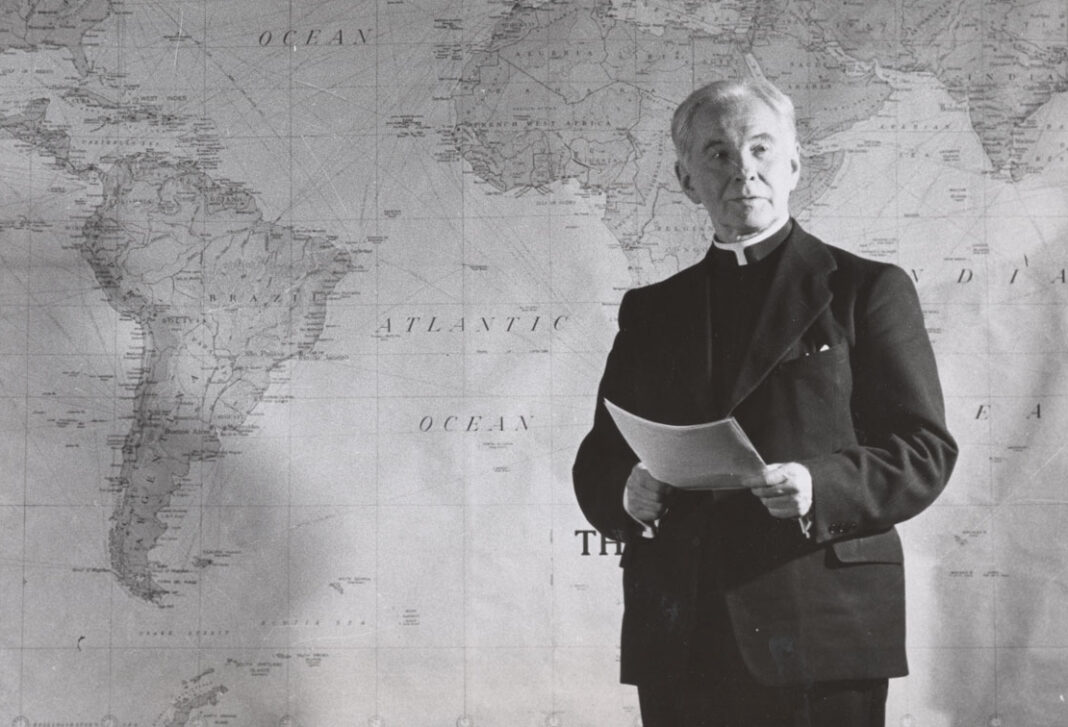![]()
On June 10, 2023, a group of concerned faculty unveiled a move to rename Fr. Edmund A. Walsh, S.J. School of Foreign Service (SFS) after Secretary of State Madeleine Albright. The renamed “Madeleine Albright School of Global Affairs” was quickly condemned in a petition signed by over 1,300 SFS students, faculty and alumni.
The petition critiqued Albright’s association “with gross human rights violations” related to U.S. intervention in the Middle East, South Asia, Africa and Eastern Europe. Most striking was Albright’s statement that the half million Iraqi children killed were, to paraphrase, “worth the price” of the sanctions she oversaw. Despite these flaws in personal character, Albright’s long-cited mentorship and guidance to 40 years of SFS students had driven the renaming effort. As of yet, Dean Joel Hellman and the SFS administration have not publicly commented on the potential change.
The campus discourse on the name change lacked a meaningful defense of Fr. Walsh’s legacy. However, students penned a second petition on June 12, 2023 supporting Fr. Walsh, which has since been signed by over 400 individuals. This spirited defense of Fr. Walsh indicates everlasting respect for his public service, advocacy for the marginalized and Catholic stewardship. To maintain the Jesuit ethos of commitment to service, justice and the common good, Georgetown must continue to recognize Fr. Walsh’s contributions as the namesake of the SFS.
Fr. Edmund Walsh was born in Boston, Massachusetts, on Oct. 10, 1885, and entered the Jesuit order in 1902. Ordained in 1916, Walsh received three degrees from Georgetown and remained on its academic staff for his entire life. Two years after taking his vows, Fr. Walsh was called upon by his nation to prepare students for military service. He served as Assistant Educational Director of the Student Army Training Corps, assisting the War Department as a crucial liaison between universities and the military. In this role, Fr. Walsh witnessed the armistice of the First World War and subsequent international arrangements formed at the Treaty of Versailles.
Upon his return to Georgetown, Walsh recognized the importance of creating a new institution that would provide America with an education in diplomacy and a cadre of public servants. His commitment to his church and country demonstrated an impeccable commitment to the Jesuit value of obedience. On Nov. 25, 1919, Fr. John B. McCreeden, S.J. and Fr. Walsh announced the SFS as an institution distinct from the College of Arts and Sciences. Their mission was to prepare a new generation of statesmen for all forms of foreign representation, which over the last century, would make the world “safer, more equitable, more prosperous, and more peaceful.”
Selected as its first regent in 1919 and serving in that capacity until the mid-1950s, Walsh possessed a Catholic ethos that became inextricably linked to the SFS curriculum and his advocacy for those facing religious repression. In 1922, Fr. Walsh served as a Vatican humanitarian in the Soviet Union, protecting Russian Catholics experiencing famine and political suppression. He single-handedly secured the Relics of St. Andrew Bobola and documented the Cieplak Trials, preventing the United States from being diplomatically recognized by the Soviet Union. Fr. Walsh also served as a diplomat to Mexico, restoring rights to Catholics and honoring the legacy of those martyred and killed in the Cristeros War.
In the 1930s, Walsh founded the Catholic Near East Welfare Association and supported the Vatican’s diplomatic mission to Iraq to establish a Jesuit school in Baghdad. In a final act of service, Walsh served as counsel to Supreme Court Justice Robert Jackson and interrogated Nazi war criminals during the Nuremberg Trials.
Perhaps Fr. Walsh’s most vocal activism was against totalitarianism and its role in persecuting minority groups, especially those with dissenting political views. While he disagreed on national security policy with then-President Franklin Roosevelt, Walsh rallied to support the country following the Pearl Harbor attacks.
“According to Walsh, Christianity did have a special argument with communism. In his speech to the FBI National Police Academy graduates, Walsh said, “the philosophy of total power for government clashed with the inherent postulates of Christianity demanding respect for the dignity of the human personality.”
Irmak Badelmi, 2003.
Fr. Walsh’s close connection to his faith and unbridled patriotism greatly informed his political ideology and the SFS for the better. American presidents, international relations scholars and global leaders sought his guidance to defend the U.S.-led, rules-based order. The profound impact of Fr. Walsh on American history is not noted outside of Georgetown and has become detached from the SFS altogether.
Despite Walsh’s outsized presence on the global stage, he did not look down upon his colleagues at Georgetown. Professor Carroll Quigley, a Georgetown professor from 1941 to 1972, penned a tribute to Fr. Walsh, praising his “kindness to people he knew only in a distant way.” He recalled early in his Georgetown career when he nearly lost his home. After mentioning his financial issue to Fr. Walsh, he was advanced $1,500 in future wages to save his family from homelessness.
During the First and Second World Wars, Fr. Walsh held vigils and mournings for students and colleagues killed in action. Our oldest living alumni at Georgetown still fondly remember Fr. Walsh’s guidance and teaching in the late 1950s, sharing our outrage at the proposed name change. Fr. Walsh deserves to possess the gravitas of great Georgetown figures like Father John Carroll and Father Patrick Healy for his commitment to our university. From ordination to death, Fr. Walsh vaulted Georgetown to national prominence and maintained the eminent position of the SFS as the leading education for diplomats and scholars alike.
Simply put, Madeleine Albright does not possess the same connection to the School of Foreign Service as Fr. Walsh. Despite teaching at Georgetown from 1982 to her passing in 2022, she merely served as an adjunct and did not contribute to graduate study or fundraising for the SFS. While The American National Security Toolbox was considered one of the highest-ranked courses among student participants, it was the only class she taught, and did not impact the vast majority of SFS students.
Instead of devoting her life to her faith or academia, Albright used her status as Secretary of State to earn lucrative jobs as a consultant or corporate board member, such as the Albright Group and the New York Stock Exchange, respectively.
Contrastingly, Fr. Walsh fostered a culture of service at the SFS, rooted in a Catholic ethos to engage productively and empathetically with the world. Despite these accomplishments, the proposed erasure of Fr. Walsh is a painful reminder of Georgetown’s incremental reduction of its Catholic identity in recent decades. Jesuits no longer occupy critical administrative positions, crucifixes were covered or removed in classrooms and prominent Georgetown figures were stripped from buildings and meeting spaces. The passion of the Georgetown community to engage with the school’s Catholic history has staved off the excesses of these changes.
As such, the removal of Fr. Walsh will set a dangerous precedent—as the only Jesuit namesake of an academic institution at Georgetown, we must collectively defend Fr. Edmund Walsh and preserve his legacy by rallying against the name change of the Walsh School of Foreign Service.











